Dental Implants – Boston, MA
Regain a Strong, Healthy, and Beautiful Smile
Tooth loss can have a multitude of negative consequences for a person's quality of life. Not only does a missing tooth increase the risk of serious oral health issues, overall systemic problems, and facial structure decline, but it can take a serious toll on confidence and day-to-day activities. At The Face Dental Group, we are dedicated to helping you regain the strong, healthy, and beautiful smile you deserve, which is why we're proud to offer dental implants in Boston. This state-of-the-art tooth replacement can address any level of tooth loss with results that look, feel, and function just like natural. To learn more about how dental implants can change your life, keep reading and give us a call today.
Why Choose The Face Dental Group For Dental Implants?
- Computer-Guided Dental Implant Placement In-Office
- Immediate Procedures & Full-Arch Dental Implants Available
- Health-Conscious & Beautiful Metal-Free Dental Implants
What Are Dental Implants?

Natural teeth are comprised of two distinct parts: the crown that shows above the gumline, and the roots that anchor them in place. Traditional tooth replacements like dental bridges and dentures can easily fill the visible gap in your smile, but they can't do anything to replace the missing root structure. Alternatively, dental implants are designed to rebuild missing teeth in their entirety for vastly superior results.
A dental implant is a small titanium post that is inserted directly into the jawbone just like the roots of a tooth. Atop the dental implant is a small connector piece called an abutment, which secures the custom-made restoration. Depending on how many teeth are missing, one or more dental implants can support a dental crown, bridge, partial, or full denture for a complete smile. This unique placement allows the patient to speak, chew, laugh, and smile with complete confidence in their new teeth!
The 4 Step Dental Implant Process

Your journey towards a new smile with dental implants will typically consist of four main steps. While each person's treatment will look slightly different, here is what you can generally expect:
- Step 1: Initial Consultation. First, we will meet with you to discuss your smile goals and review your oral health. This is where we will plan out your treatment from start to finish, as well as determine if any preliminary treatments are needed.
- Step 2: Dental Implant Placement. Most other dental practices need to refer their patients to an outside specialist to have their dental implants placed since it is such a specialized service. At The Face Dental Group, our team of experienced experts uses the latest technology and strategies to complete this step right here in our office!
- Step 3: Osseointegration. Once the dental implant has been set in place, the healing process will begin. Over the next several months, the titanium post will fuse with the bone tissue in your jaw in a process called osseointegration.
- Step 4: Final Restoration Placement. Finally, you'll return to our office to have your brand-new, custom-made restoration attached to the dental implant.
Don't Wait to Smile with Immediate Dental Implants
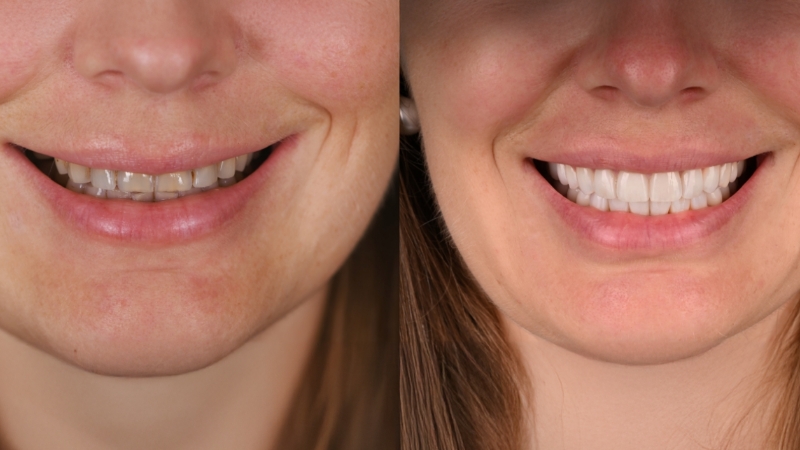
Traditionally, getting dental implants after a tooth extraction can be a long and cumbersome process spanning several months. Fortunately, thanks to our cutting-edge technology and highly experienced team, we are able to dramatically slim down the timeframe so our patients can enjoy their new dental implants right away. Depending on your situation, you may be a good candidate for immediate dental implants, where we place the implants directly after removing a tooth. We will go over your candidacy and benefits of this type of restoration during your consultation, but here are some of the most common benefits of immediate dental implants:
- Fewer Surgeries and Faster Treatment: Immediate implants streamline the treatment process by often combining extraction and implant placement in a single appointment. This significantly reduces overall treatment time, enabling patients to receive their permanent restoration sooner.
- Aesthetics: Immediate dental implants in the anterior region notably preserve the natural appearance. Placing an implant promptly after tooth extraction minimizes bone and gum tissue loss, maintaining the natural contours of the jaw and gum line. The result is an aesthetically pleasing outcome.
- Preservation of Bone and Soft Tissue (Gums): Immediate implant placement, coupled with simultaneous site enhancement procedures, helps mitigate bone and soft tissue changes in the extraction socket. This approach stabilizes bone and soft tissue volume, crucial for long-term implant success and stability.
- Improved Healing: In many cases, immediate dental implants promote faster and more predictable healing. The implant serves as a scaffold for new bone formation, creating a robust and stable foundation for the final restoration.
- Minimized Discomfort: Combining tooth extraction with implant placement reduces the number of surgical procedures, resulting in decreased postoperative discomfort and a shorter recovery period.
- Patient Convenience: Patients value the convenience of a streamlined process, with fewer appointments and less time in the dental chair perceived as significant advantages.
- Psychological Benefits: Immediate dental implants contribute to positive psychological effects on patients. The knowledge that they can maintain their smile shortly after tooth extraction reduces anxiety and enhances their overall experience.
Understanding the Cost of Dental Implants

The cost of dental implants varies from case to case. It depends on multiple factors. When you visit us for your consultation, we can discuss some specific numbers and help you understand your payment options, such as insurance and financing. We want everyone to be able to experience the benefits of dental implants, so you can expect us to make every effort to work within your budget. Even though dental implants cost more than traditional forms of tooth replacement, they are an excellent long-term value that can rightly be viewed as a smart investment.
Preliminary Treatments & Dental Implant Surgery
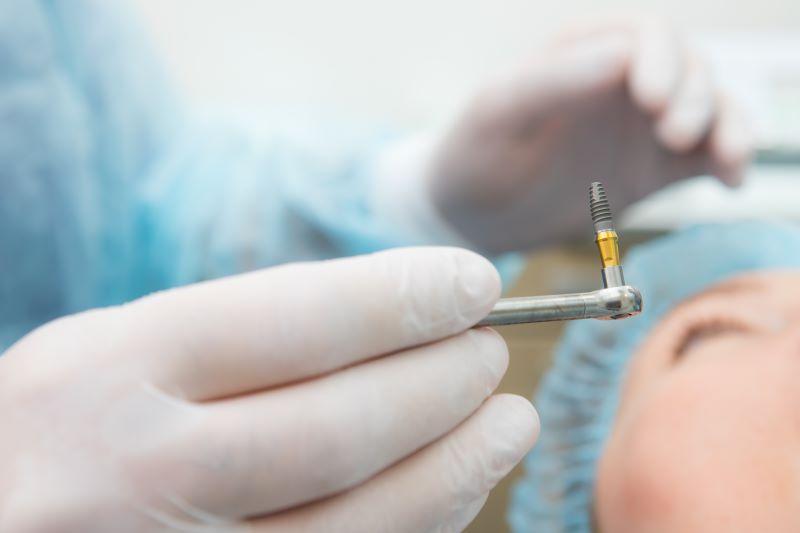
Before receiving dental implants, some patients require preliminary treatment, such as gum disease therapy, a bone graft, or tooth extractions. Logically, such procedures have their own cost. Our team is able to carry out all implant-related treatments, and whenever possible, we perform them at the same time as the implant surgery in order to be as efficient and economical as possible.
The implant surgery itself has a price that is separate from preliminary treatments. We use state-of-the-art technology, including surgical guides, to provide our patients with the greatest value possible.
The Parts of Your Dental Implants
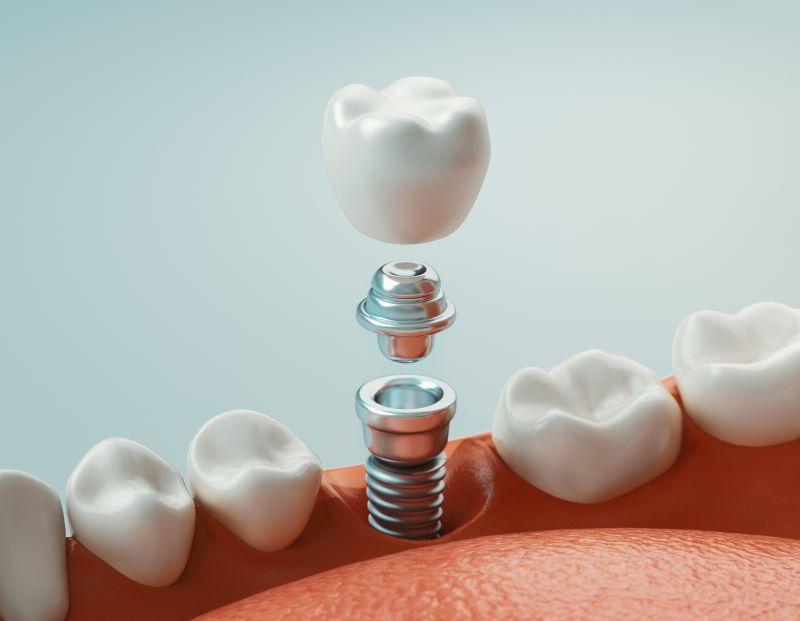
Every dental implant treatment is unique. The number of implants you receive, the type of restoration you require, and the manufacturer that provides your implants can all have a bearing on the total cost of your treatment. If you ever have questions about where the parts of your implants come from, simply ask our team. We strive to always use top-quality materials!
How Dental Implants Can Save You Money

Dental implants require a significant upfront financial commitment, but they could actually help you save money in the long run in a few ways:
- Because we perform guided surgery, we guarantee results. You will not need to worry about spending extra money to correct issues that result from human error during the procedure.
- Dental implants can last a lifetime. Their longevity makes them a better monetary value than traditional dentures, which usually need to be replaced every 5 – 7 years or so.
- Dental implants support your health. By supporting your oral and overall health, implants may reduce the need for expensive treatments in the future.
Does My Dental Insurance Cover Dental Implants?

Some dental insurance plans cover implants, while others do not. (Coverage is becoming more common because implants are widely recognized as the best form of tooth replacement.) You will need to look at the details of your policy to find out how it applies. Even if it will not cover the implants themselves, it may help you to pay for preliminary procedures or your final restoration. Our team can help you understand your benefits and file claims on your behalf.
Making Dental Implants Affordable

We want you to be able to afford a healthy and complete smile, so you can rely on us to help you understand all of your payment options. For example, you might qualify for low-interest financing that allows you to pay for your treatment via manageable monthly installments.
We also strive to be adaptable. Simply let us know about any financial concerns you have, and we will do our best to come up with a treatment plan that works with your unique budget.
Computer-Guided Dental Implant Placement
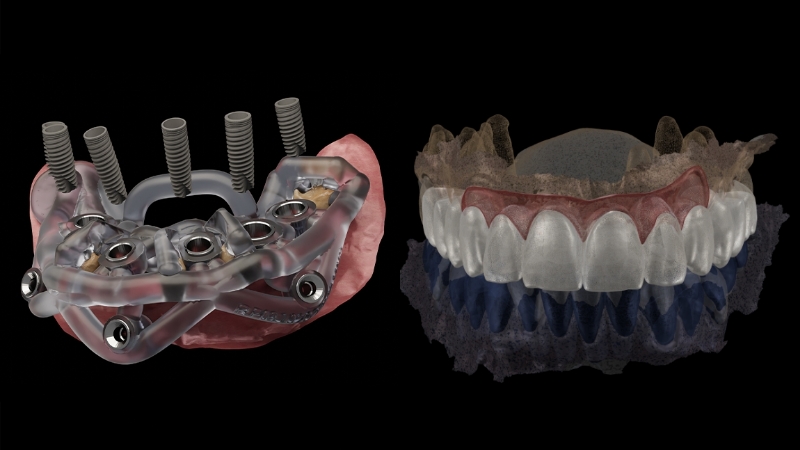
Whether it is single tooth or full-arch case, every implant we undertake goes through meticulous planning that extends beyond the precise positioning of implants in the bone to ensure that the exact 3D orientation will optimally support the future prosthesis.
Our methodical approach involves the following sequence: Once the digital planning of both the future prosthesis and implant positions is complete, we craft computer-based 3D printed surgical guides. These guides play a crucial role in the precise delivery of implants and the prosthesis (teeth).
Advantages over traditional dental implant surgery include:
- Improved Precision and Safety: Our approach enhances accuracy, ensuring a safer implant procedure.
- Reduced Surgery Time: The streamlined process significantly cuts down on surgical time.
- Less Invasive Surgery: The precision of our approach minimizes invasiveness, leading to reduced postoperative discomfort.
- Optimal Implant Positioning: Implants are strategically placed to better receive the future prosthesis, enhancing its lifespan and ease of maintenance. Also, it allows for ideal design of the prosthesis, which is more accessible for cleaning.
Whether dealing with a simple or complex case, our practice adheres to the standard of computer-based guided dental implant placement, coupled with proactive design for the future prosthesis.
Advanced Dental Implant Procedures: Bone Grafting
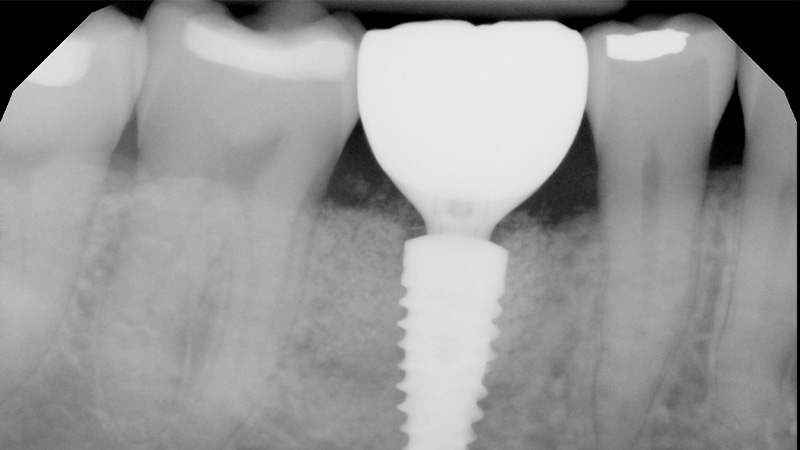
Due to natural bone resorption or other factors, some patients have a jawbone that is too thin or weak to accommodate dental implants. During your consultation, we will take some images that will allow us to assess the state of your bone. Based on what we learn, we can determine whether or not a bone graft will be necessary.
If you do need a bone graft, we will share some details about the surgery with you and clearly explain how it may affect your total treatment timeline. Some patients are able to undergo a bone graft and get dental implants during the same appointment. In other cases, a waiting period of a few months is necessary so the grafted material has time to integrate with the surrounding tissue.
We usually try to avoid the need for bone grafts by performing immediate implant placement (in other words, we try to place dental implants right away after tooth extractions). However, that is not always possible.
Dental Implant Failure & Salvage

Dental implant failure is rare, but it can still happen due to issues like infection, physical trauma, and underlying medical conditions. If you ever believe something is not quite right with one of your implants, get in touch with our team right away. We will carefully examine your mouth, ask about your symptoms, and recommend your next steps. Our goal is to get your smile’s health and strength back on track in the most efficient, conservative manner possible.
Learn More about Dental Implant Failure & Salvage
Maintaining & Caring for Your Dental Implants

Dental implants are the most durable form of tooth replacement. In fact, they have the potential to last for decades! However, they will only reach that potential if you take reasonable measures to care for them. What are some specific things you should do to maintain your dental implants? Continue reading below to find out.
Make Oral Hygiene a Priority
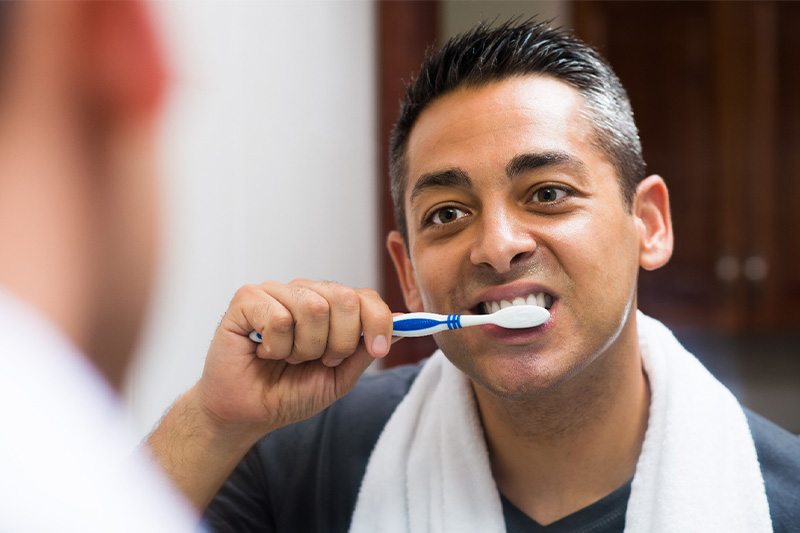
Thorough oral hygiene can get rid of harmful bacteria and prevent infections that could lead to dental implant failure. To maintain a clean mouth, you should:
- Thoroughly brush your teeth at least twice a day. Use a soft brush and non-abrasive toothpaste. Be sure to clean the backs of your teeth and the area along your gumline.
- Clean between and under your teeth. Floss or a water flosser can help to clean the tight spaces between your teeth and beneath your implant-supported bridges.
- Take other steps. You may need to use an antibacterial mouthwash or use other methods to maintain a clean mouth. Ask our team for tips!
Eat a Healthy Diet

A healthy diet protects your overall wellness and reduces the risk of damage to your implants and the surrounding tissue. Try to minimize your intake of hard, sticky, and sugary foods. These can contribute to dental damage and harmful bacterial growth. Instead, center your diet on items that support oral health. For example, you should be sure to get enough calcium, vitamin D, and vitamin C.
Break Bad Habits

Some bad habits that might harm your implants include:
- Smoking. This habit can drastically increase your risk of dental implant failure. Talk to your primary care physician if you need help quitting.
- Excess alcohol consumption. Heavy drinking can adversely affect jawbone health. If you drink, do so only occasionally and in limited amounts.
- Biting on hard objects. Biting on ice, pen caps, or other hard objects might break your restorations.
Protect Your Dental Implants
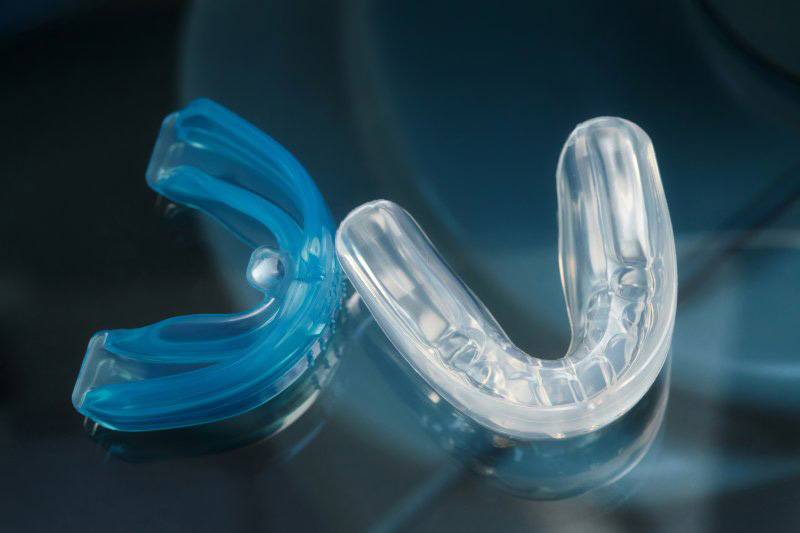
If you play sports, it would be wise to wear a mouthguard, which can drastically reduce the risk of injury to your mouth and dental implants. Custom mouthguards from a dentist tend to be more effective and comfortable than over-the-counter options.
If you tend to grind your teeth at night, you may need a different type of mouthguard — one that is designed to place a protective barrier between your upper and lower dental arches.
Schedule Regular Dental Checkups

Even if you no longer have any of your natural teeth, you should still make it your custom to visit your general dentist for a cleaning and checkup twice a year. They can clean your implant abutments and your restorations and look for any indications that your oral health is developing problems. They can also give you personalized tips to help you care well for your smile on a daily basis.
Who Dental Implants Can Help

Dental implants are a versatile treatment that can be used to replace any number of missing teeth. Plus, most patients are eligible for them (or can become eligible after preparatory care). Of course, the best way to find out if they are right for you is simply to visit us for a consultation. After we thoroughly examine your mouth, we will talk to you about your options and start designing your path toward a stronger, healthier, more confident smile.
Who Is a Good Candidate for Dental Implants?
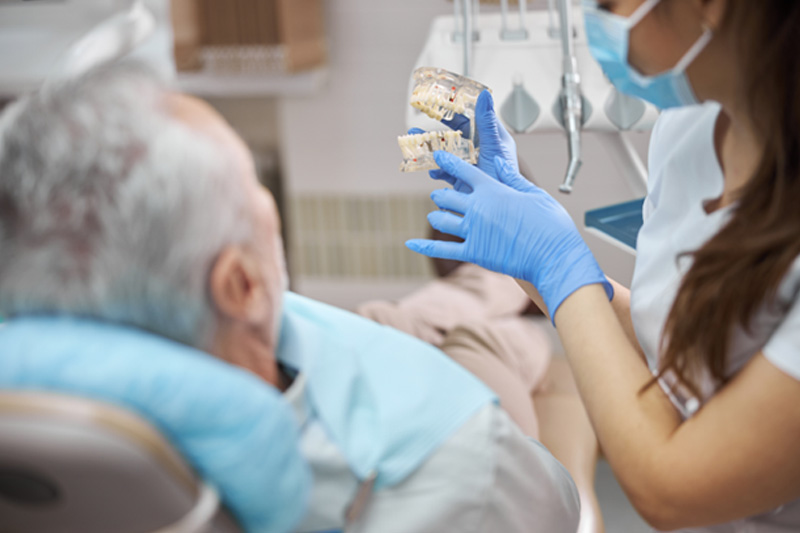
There are three general qualifications that are important for dental implant candidates:
- Fair overall health. You should be well enough to undergo minor surgery. For example, if you have diabetes, it should be well-managed.
- Good oral health. You should not have active gum disease or other conditions that might compromise the success of your dental implants.
- Adequate jawbone size and strength. It is important that your jawbone is healthy enough and large enough to accommodate your dental implants.
If you are unsure of whether you meet the above-listed criteria, we still invite you to come in for a consultation. Most adults can qualify for dental implants, either right away or after some preparatory care.
Missing One Tooth
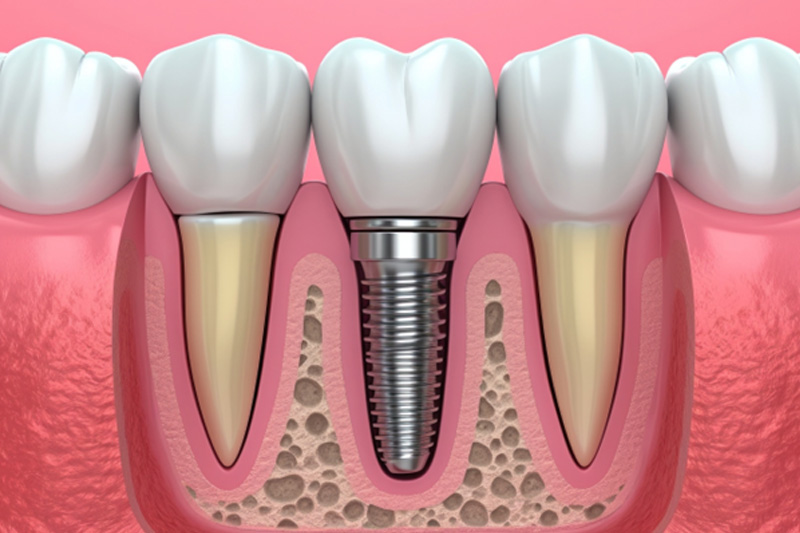
If you are missing just one tooth, replacing it with a dental implant should be fairly simple. We can place a single implant post at the site of your lost tooth. After it has had time to fully bond with the surrounding bone tissue, you can receive a beautiful new crown to replace the visible portion of the missing tooth.
A single implant is superior to a traditional fixed bridge because it does not usually require that the nearby teeth undergo any modifications. Plus, an implant can stimulate the jawbone and help to keep it healthy and whole.
Missing Multiple Teeth
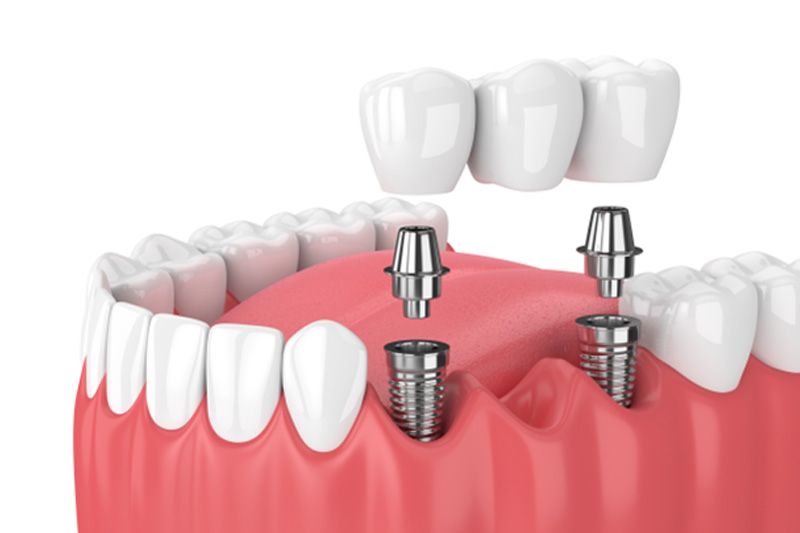
If your missing teeth are adjacent to one another, you may benefit from an implant-supported bridge. If you are missing just two teeth, a single implant may be able to support a crown and a pontic (artificial tooth). If you are missing three or more teeth, we may place an implant at each end of the gap. Together, they can support the appropriate number of crowns and pontics.
If your missing teeth are not consecutive, we will explore other options. For example, you might need multiple single implants or a partial implant denture.
Missing All Teeth
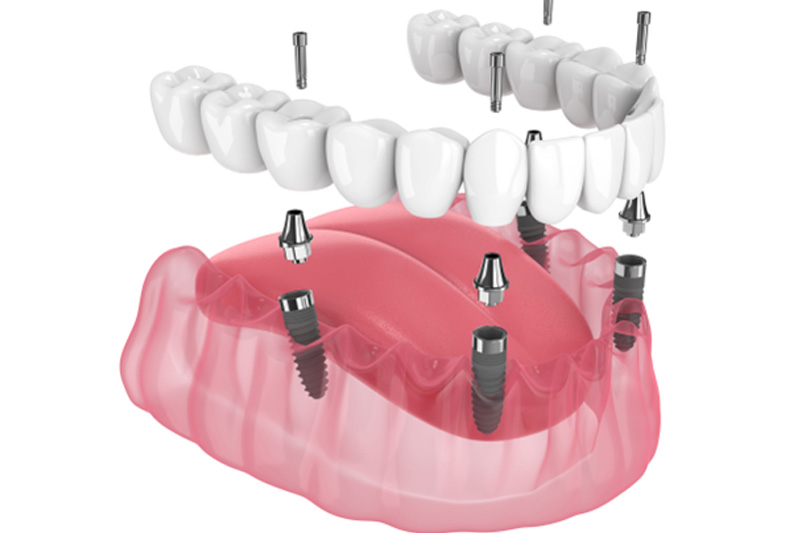
If you are missing all of your teeth throughout one of your arches, we can place a strategic number of implants in your jawbone (we strive to use as few implants as possible without compromising the strength of the final prosthetic). Depending on the details of your procedure, you may be able to receive artificial teeth on the same day as your implant procedure. Later, the temporary denture will be replaced by a permanent one.
Here at The Face Dental Group, we specialize in Star Concept™ full arch implants. This treatment uses a special streamlined process that is designed for ultimate precision and optimum results!
Dental Implant FAQs
Are Dental Implants Safe?
Dental implants have a success rate of more than 95%. For the vast majority of patients, they are able to provide tooth replacement that is effective, reliable, and safe.
Of course, no medical procedure is completely risk-free. There is always a very small chance of infections and other complications.
Our team will evaluate your oral and overall health to determine if you have any risk factors that could affect your treatment’s outcome. Issues like diabetes, cancer, certain allergies, and other medical conditions will all be carefully considered. A history of gum disease is also something that we take into account. If our evaluation reveals any cause for concern, we will talk to you about our findings and help you understand the road in front of you.
Are Dental Implants an Eligible HSA Expense?
In most cases, yes, dental implants are considered eligible for healthcare savings account (HSA) funds. Our team can help you to verify whether your treatment qualifies. Simply give us your HSA information so we can verify its terms and conditions.
Regardless of whether you qualify for HSA reimbursement, our team will work to make sure you clearly understand the financial aspect of your care so you do not run into any unpleasant surprises when you are paying for treatment.
How Long Do Dental Implants Last?
Dental implants are designed to stand the test of time. In fact, for many patients, they provide a lifetime of benefits!
Of course, the longevity of your new teeth will depend partially on you. You should be committed to good habits that will reduce your risk of dental implant failure. For example, you should have a thorough oral hygiene routine, attend regular dental checkups, and eat a balanced, nutritious diet. It is also strongly recommended that you avoid cigarettes and other tobacco products.
How Successful Are Dental Implants?
Dental implants are successful in more than 95% of cases. Our team does everything we can to make sure that each patient experiences positive results. For example, we use state-of-the-art technology to perform guided surgery, which minimizes the risk of human error and reduces the chances of future implant failure.
It is worth noting that various factors can affect dental implant success rates. Your overall health, the state of your mouth, and other considerations may have a bearing on your treatment’s final outcome. Our team can discuss such issues with you so you can make a well-informed decision about how to move forward.
How Long Does It Take to Recover from Dental Implant Surgery?
Most patients are able to return to work and other normal activities within a day or two of their surgery. (If your job requires a lot of physical activity, you might need to stay home for up to a week or two.)
The soft tissue at your implant sites should heal within a few weeks. The bone will take at least a few months to fully recover and form a strong bond with your implants.
How Soon After a Tooth Extraction Can I Get Dental Implants?
Whenever possible, we perform immediate dental implant placement. In other words, you can get implants on the same day as your tooth extractions! This streamlines the entire tooth replacement process and reduces the number of surgical procedures that you must undergo.
If there are circumstances that prohibit immediate implant placement, such as certain types of infections, you may have to wait 3 – 6 months before your implant procedure.


